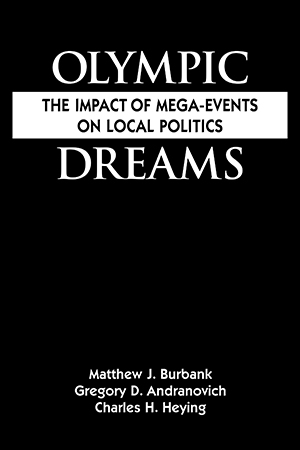Matthew J. Burbank, Gregory D. Andranovich, and Charles H. Heying
What drives cities to pursue large-scale, high-profile events like the Olympic games? What are the consequences for citizens and local governments? Investigating local politics in three U.S. cities—Los Angeles, Atlanta, and Salt Lake City—as they vied for the role of Olympic host, this book provides a compelling narrative of the evolving political economy of modern megaevents.
The authors reveal how the megaevent strategy typically is initiated by a coalition of public and private elites; how citizen involvement is managed and often curtailed; and how latent development agendas are revived and refocused to leverage Olympic opportunities. In assessing the impact of megaevent-driven growth, they look beyond the tax revenues and stadium costs to offer a nuanced examination of the ways Olympic dreams affect local governance and social conditions in urban economies.
Matthew J. Burbank is associate professor of political science at University of Utah. Greg Andranovich is emeritus professor of political science at California State University, Los Angeles. Charles H. Heying is associate professor of urban studies and planning at Portland State University.
"Olympic planners in New York City ... and other Olympic-city wannabes should read this book to get a sneak preview of what lies ahead. Planners in Los Angeles, Atlanta, and Salt Lake City should read this book to relive the good old days (and some bad ones). Planners in all other cities and towns should read this book to gain a good understanding of the role of mega-events in the new global economy and the impact of these events on American cities."—Paul B. Kelman, Journal of the American Planning Association
"The authors ... convincingly demonstrate that politics, economics, and image are irretrievably yoked in urban politics."—Dennis R. Judd, Journal of Politics
"This volume not only answers the questions of why and how cities pursue megaevents like hosting the Olympic games, but it weaves empirical research with competing literatures to make important contributions to understanding current urban politics. It will quickly occupy an important place in the literature."—David J. Olson, University of Washington






